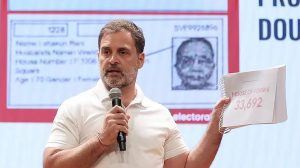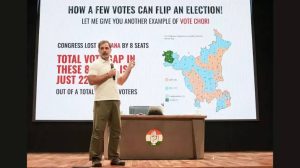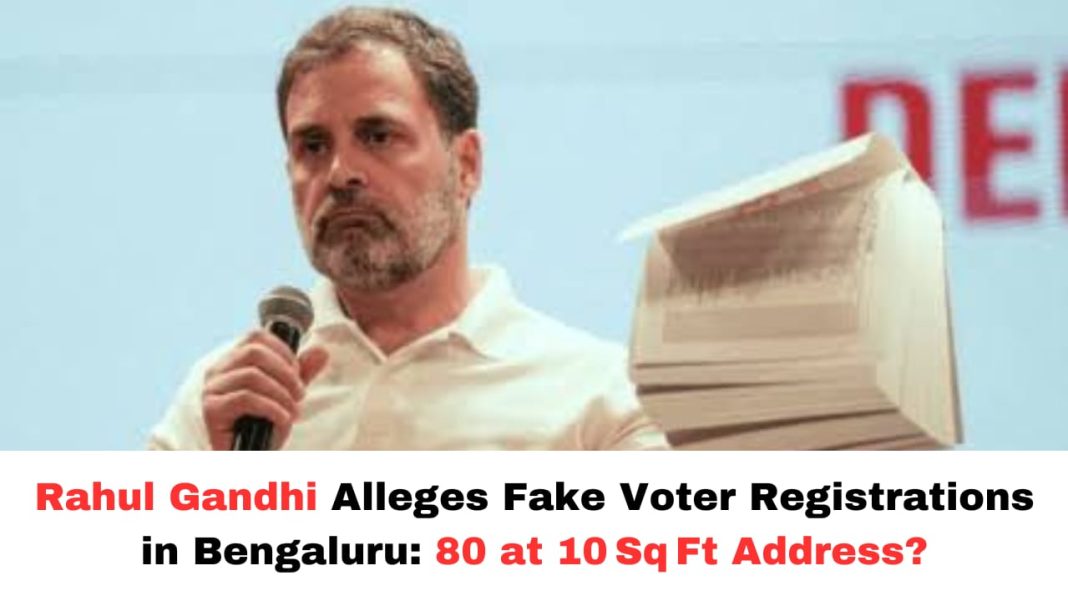Digital News Guru National Desk:
Alleged Voter Fraud in Bengaluru: A Deep Dive into Rahul Gandhi’s Claims and the Response
On August 8, 2025, Congress leader Rahul Gandhi intensified his campaign against the Election Commission of India (ECI), asserting that widespread manipulation of electoral rolls in Karnataka’s Mahadevapura assembly segment severely impacted the outcome of the Bangalore Central Lok Sabha constituency. His claims—backed by a dramatic breakdown of anomalies—have ignited political firestorms, investigations, and sharp rebuttals from electoral authorities and opponents. Here’s what we know:

What’s Happened
- Ground report confirms anomaly: India Today’s investigation discovered that 80 individuals are registered as voters at a tiny 10–15 sq ft property in Booth No. 470, House No. 35, Muni Reddy Garden, Bengaluru Central constituency.
- Questioning the claim: The actual occupant of the property, and its owner, have rebutted the allegation. The owner clarified that the tenants—primarily temporary migrant workers—used rental agreements to obtain voter IDs, often retaining them even
The Allegations Laid Out
Rahul Gandhi describes the Bengaluru constituency as a prime example of targeted electoral fraud. He claims that out of approximately 650,000 registered voters, over 100,000 were bogus entries, categorized into five concerning types:
- Duplicate voter entries — 11,965 entries representing the same individuals registered across multiple booths.
- Fake or invalid addresses — 40,009 entries linked to nonexistent or unverifiable locations.
- Bulk registrations at single addresses — 10,452 instances of many voters registered under one roof, including examples such as 80 in a one-room dwelling.
- Invalid photographs — 4,132 entries featured non-identifiable or missing photos.
- Misuse of Form‑6 — 33,692 new voter forms were allegedly misused, even listing older citizens like a 70-year-old woman twice.
Gandhi’s team suggests these manipulations may have suppressed Congress’s margin enough to flip results in favor of the BJP.
Ground-Level Evidence: The “10‑15 sq ft House” Claim
One striking detail that grabbed attention involved a crammed 10–15 sq ft house in Muni Reddy Garden. According to India Today’s ground report, 80 voters were registered at this address—raising red flags about the integrity of the rolls.
However, further investigation revealed nuances: the current occupant, a food delivery worker from West Bengal, had nothing to do with those registrations. The property owner explained that many of the names belonged to past migrant tenants—who sometimes still return to vote—even after vacating the home.

Official Pushback from the Election Commission
The Election Commission, along with the Karnataka Election Officer, has taken a firm stand against the allegations:
- Formal affidavit demanded: Rahul Gandhi has been asked to submit a signed, sworn declaration detailing affected names, serial numbers, and part numbers—failure to do so may have legal consequences.
- Use of voter rolls defended: The ECI pointed out that Karnataka’s government itself uses the same electoral rolls for its caste census—underscoring the rolls’ authenticity.
- The Uttar Pradesh CEO dismissed certain duplicate registration claims, stating that individuals cited (e.g., Aditya Srivastava, Vishal Singh) were not registered in multiple states as alleged.
Political Support & Opposition Reactions
- Congress leaders rally behind Gandhi: Karnataka CM Siddaramaiah, Dy CM DK Shivakumar, and others on behalf of the party continue to support the claims, citing “full documentation” and calling for thorough investigations.
- Critics call for evidence: The BJP and sections of media have raised doubts about the validity of these claims—particularly pointing to the “10‑15 sq ft house” example, which India Today’s own ground check seems to nuance rather than support outright fraud.
- Some commentators suggest that instead of a political press conference, Gandhi should have lodged a formal petition in the allotted 45-day window.
Why It Matters
The controversy touches upon foundational questions about electoral transparency, data integrity, and public faith in democratic mechanisms. Allegations of 100,000+ illicit entries—even if concentrated in one constituency—have broader implications for national trust in electoral outcomes.
Key battlegrounds:
- Process vs. politics: Rahul Gandhi’s allegations mix forensic-style data presentation with political urgency. The demand for e-rolls and CCTV footage echoes global calls for open governance.
- Urban dynamics: Mahadevapura’s ever-evolving migrant population and shifting residential patterns may exacerbate roll inaccuracies—whether accidental or intentional.
- Institutional credibility: The ECI’s insistence on formal affidavits aims to reinforce due process, but some argue it also deflects public scrutiny.

Conclusion
At the heart of this growing political storm is a serious demand: accountability. Rahul Gandhi’s “vote theft” charge—complete with harrowing numbers and photographs—has triggered high-stakes debate. The ECI’s pushback, while procedural, leaves unanswered questions about how India can strengthen voter roll accuracy in fluid urban settings. As investigations proceed and declarations await signing, this episode highlights the need for concrete evidence, robust oversight, and electoral reform.
You May Also Read: India’s Rajya Sabha Approves Coastal Shipping Bill 2025 Amid Opposition Protests








